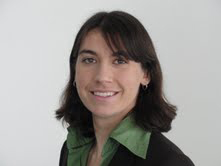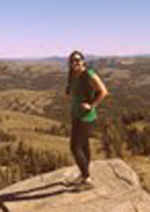The Environmental Studies major is an interdisciplinary major that incorporates both natural and social science studies. It gives students an opportunity to learn about the environment through lenses such as ecology, biology, chemistry, agroecology, policy, sociology, education, and law to try and solve some of the environmental issues we are faced with today.
Two ENVS alumnae talked to our department about the various ways the department and the major prepared them for joining the workforce. Jacqueline McCrory and Laura Kelly have found jobs in the environmental sciences, and shared with us what tools they used to find work they enjoy.
After graduating in 2010, Jacqueline McCrory put her Environmental Studies degree to use by accepting a job working with the Department of Fish and Wildlife’s (DFW) California Natural Diversity Database program, mapping California’s special status flora and fauna. After a year with DFW, Jacqueline began working as an environmental analyst/biologist for an environmental consulting firm based out of Sacramento called Analytical Environmental Services. Jacqueline says that the “interdisciplinary nature of the ENVS major proved highly beneficial for my current job, which requires diverse knowledge and experience spanning a variety of subject areas to be successful”.
During her senior year at UCSC, Jacqueline searched for environmental jobs by utilizing academic job boards, state and federal governmental job boards (such as usajobs.gov), environmental email list serves (such as ECOLOG), as well as looking up individual environmental consulting firms and environmental position openings at non-profit agencies. She ultimately submitted approximately 100 different job applications before she graduated from UCSC, and started working at DFW soon after. She recommends submitting as many applications as possible. “It is a highly competitive process and it is important to keep your options open and not be too picky in terms of job titles during the application process,” she said. “If nothing else, you can always benefit and grow from the application and interview process and be better prepared for future opportunities.”
For students still in school, wondering how to prepare for the environmental job market, Jacqueline recommends completing an internship – she worked in four different positions while at UCSC, and felt that they were invaluable towards building her job-related skills and abilities. “The short-term internships allowed me to quickly build up my resume with a variety of skills, experiences, and contacts while completing my undergraduate degree, and helped set me apart from other applicants,” she said.
Jacqueline took a year off from school after graduating from UCSC before applying and being accepted to the Masters of Science program in Environmental Management at the University of San Francisco. “There are so many job possibilities and opportunities that students may not even be aware of while in their undergraduate program,” said Jacqueline. “Stepping out of the academic umbrella and exploring different options is an exciting process that every student should experience after graduating.”
ENVS alumna Laura “Lily” Kelly, (2008), is working with Global Green in New York, which focuses on minimizing the availability of weapons of mass destruction, increasing clean water availability, and decreasing the emissions that contribute to climate change. Under the Coalition of Resource Recovery program, she looks at paper and food waste recycling. Lily is working to reduce the 95% of food waste that goes into landfills by distributing processing to small units that process waste on site to turn into useable soil, or by transporting waste to facilities locally.
As well, Lily and Global Green are pushing for companies to recycle as many paper products as possible while minimizing the amount of packaging that goes into landfills each year.
While at UCSC, Lily worked with the campus Environmental Health and Safety Program where she created a website for their storm water program. She also worked for the Chancellors Undergraduate Internship Program for their sustainability project and helped create what is now the Sustainability Office. Lily also worked as an intern with Ecology Action and their recycling program.
After graduating from UCSC, Lily found it very helpful to take a year off from school and take advantage of opportunities that she had not been able to while in college. Lily first worked for Green Peace, then at an organic farm in Rhode Island - she said the cold weather there caused her to seek work in a warmer climate, eventually moving her to India to work on a dairy farm. She applied to grad school and from India moved to New York to attend graduate school at Columbia University.
Lily stayed at Columbia and worked as a research assistant until she found her current job at Global Green. However, Lily believes that a graduate degree isn’t a requirement for finding employment in environmental fields. She believes there is a significant amount of opportunities, especially in the private sector, or with the government, and with non-profits.
Both Jacqueline and Lily are doing very well in their respective careers. Both wish to convey to undergraduate ENVS majors that hard work and diligent effort pay off for those who want careers in Environmental Studies. Jacqueline and Lily also both emphasized that students new to the workforce should remember why they chose the ENVS major - what is really important - to have a positive effect on the environment.


